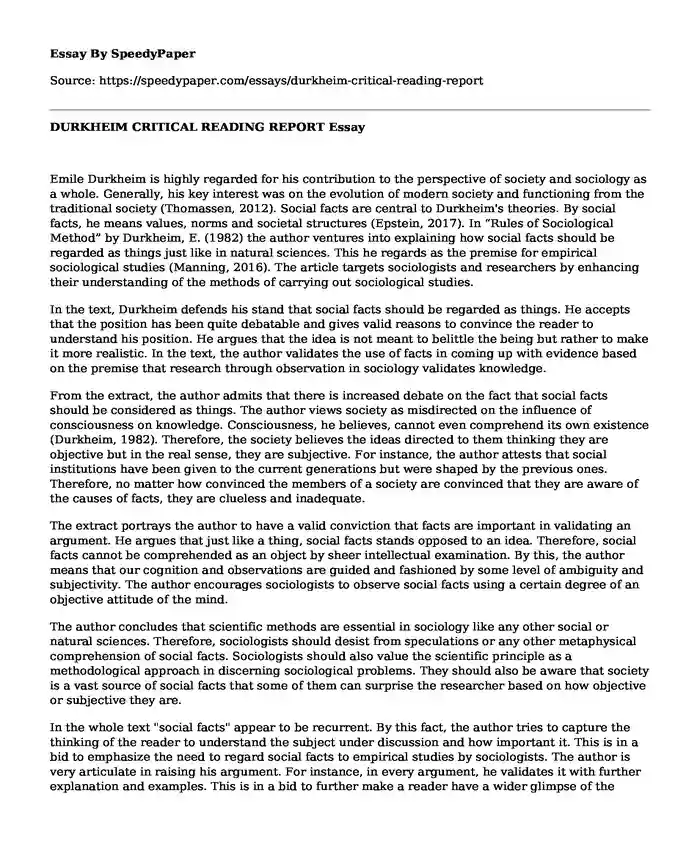
| Type of paper: | Critical thinking |
| Categories: | Company Management Psychology United States Law |
| Pages: | 3 |
| Wordcount: | 727 words |
Emile Durkheim is highly regarded for his contribution to the perspective of society and sociology as a whole. Generally, his key interest was on the evolution of modern society and functioning from the traditional society (Thomassen, 2012). Social facts are central to Durkheim's theories. By social facts, he means values, norms and societal structures (Epstein, 2017). In "Rules of Sociological Method" by Durkheim, E. (1982) the author ventures into explaining how social facts should be regarded as things just like in natural sciences. This he regards as the premise for empirical sociological studies (Manning, 2016). The article targets sociologists and researchers by enhancing their understanding of the methods of carrying out sociological studies.
In the text, Durkheim defends his stand that social facts should be regarded as things. He accepts that the position has been quite debatable and gives valid reasons to convince the reader to understand his position. He argues that the idea is not meant to belittle the being but rather to make it more realistic. In the text, the author validates the use of facts in coming up with evidence based on the premise that research through observation in sociology validates knowledge.
From the extract, the author admits that there is increased debate on the fact that social facts should be considered as things. The author views society as misdirected on the influence of consciousness on knowledge. Consciousness, he believes, cannot even comprehend its own existence (Durkheim, 1982). Therefore, the society believes the ideas directed to them thinking they are objective but in the real sense, they are subjective. For instance, the author attests that social institutions have been given to the current generations but were shaped by the previous ones. Therefore, no matter how convinced the members of a society are convinced that they are aware of the causes of facts, they are clueless and inadequate.
The extract portrays the author to have a valid conviction that facts are important in validating an argument. He argues that just like a thing, social facts stands opposed to an idea. Therefore, social facts cannot be comprehended as an object by sheer intellectual examination. By this, the author means that our cognition and observations are guided and fashioned by some level of ambiguity and subjectivity. The author encourages sociologists to observe social facts using a certain degree of an objective attitude of the mind.
The author concludes that scientific methods are essential in sociology like any other social or natural sciences. Therefore, sociologists should desist from speculations or any other metaphysical comprehension of social facts. Sociologists should also value the scientific principle as a methodological approach in discerning sociological problems. They should also be aware that society is a vast source of social facts that some of them can surprise the researcher based on how objective or subjective they are.
In the whole text "social facts" appear to be recurrent. By this fact, the author tries to capture the thinking of the reader to understand the subject under discussion and how important it. This is in a bid to emphasize the need to regard social facts to empirical studies by sociologists. The author is very articulate in raising his argument. For instance, in every argument, he validates it with further explanation and examples. This is in a bid to further make a reader have a wider glimpse of the subject matter. Furthermore, the author uses simple language as opposed to complex grammar. This enables the reader to easily understand the subject matter (Gordon and Lowder, 2012).
In conclusion, from the text, society can only be found on social facts. Just like in natural science, social facts should be regarded as things in a bid to be more realistic and empirical. Therefore, for a sociologist to be realistic and objective, they should endeavor to approach societal issues empirically and assimilate the fact that social facts are things just like in natural sciences.
Bibliography
Durkheim, E. (1982) Rules of Sociological Method. Basingstoke: Macmillan. Pp 35-7.
Epstein, B. (2017), "Social Construction and Social Facts", The Routledge Handbook of Collective Intentionality, pp. 265-276.
Gordon, P. and Lowder, M. (2012). Complex Sentence Processing: A Review of Theoretical Perspectives on the Comprehension of Relative Clauses. Language and Linguistics Compass, 6(7), pp.403-415.
Manning, P. (2016). Goffman and Empirical Research. Symbolic Interaction, 39(1), pp.143-152.
Thomassen, B. (2012). Emile Durkheim between Gabriel Tarde and Arnold van Gennep: founding moments of sociology and anthropology. Social Anthropology, 20(3), pp.231-249.
Cite this page
DURKHEIM CRITICAL READING REPORT. (2022, Dec 09). Retrieved from https://speedypaper.com/essays/durkheim-critical-reading-report
Request Removal
If you are the original author of this essay and no longer wish to have it published on the SpeedyPaper website, please click below to request its removal:
- Influence of Society on the Individual Essay Samples
- MDS Micro Vs Supermicro/ Brown/ Dickerman - Free Essay in Antitrust Law
- Free Essay with a Project Summary on Nurses' Productivity
- Education Essay Sample: Foreign Classes for High School Students
- New England Airfoil Products Inc.
- Free Essay: United Healthcare Evaluation
- Paper Example: The Goldilocks Theory on Gender
Popular categories




